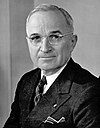Harry S. Truman was the thirty-third President of the United States (1945–1953); as vice president, he succeeded to the office upon the death of Franklin D. Roosevelt. As president, Truman faced challenge after challenge in domestic affairs: a tumultuous reconversion of the economy marked by severe shortages, numerous strikes, and the passage of the Taft-Hartley Act over his veto. After confounding all predictions to win re-election in 1948, he was able to pass almost none of his Fair Deal program. Truman's presidency was eventful in foreign affairs, with the end of World War II, the founding of the United Nations, the Marshall Plan to rebuild Europe, the Truman Doctrine to contain Communism, the beginning of the Cold War, the creation of NATO, and the Korean War. Truman, whose demeanor was very different from that of the patrician Roosevelt, was a folksy, unassuming president. He popularized such phrases as "The buck stops here" and "If you can't stand the heat, you better get out of the kitchen." He overcame the low expectations of many political observers who compared him (unfavorably) to his highly regarded predecessor. At one point in his second term, Truman's public opinion ratings were the lowest on record, but popular and scholarly assessments of his presidency became more positive after his retirement from politics and the publication of his memoirs. He died in 1972. Many U.S. scholars today rank him among the top ten presidents. Truman's legendary upset victory in 1948 is routinely invoked by underdog presidential candidates. (more...)
Recently featured: Wood Badge – Soviet invasion of Poland of 1939 – France national rugby union team
